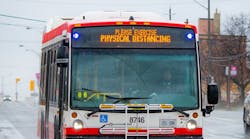TTC to recall remaining employees in first week of November
The Toronto Transit Commission (TTC) will recall the remaining 179 furloughed frontline employees, including 97 bus operators, in the first week of November.
This will help the agency meet service demands brought about by changing ridership patterns, a major planned capital project and a new cohort of high school students returning to class.
"Throughout the pandemic, we have continued to monitor ridership in real time and adjust service to meet demand," said TTC CEO Rick Leary. "We've also been looking for opportunities to take advantage of the reduced ridership to advance major capital work at a time it would inconvenience the fewest customers."
In making the decision to recall the remaining employees, the TTC took the following factors into consideration:
- As schools and more businesses re-opened over the past two months, the TTC has seen ridership on the bus network increase faster than on other modes. Daily boardings on buses are now at 50 percent of pre-pandemic levels and holding. As well, ridership patterns have changed from the traditional peak periods with customer trips more evenly spread throughout the day.
- In a report to the TTC Board, the TTC is seeking approval to advance a major asbestos removal program by one full year by closing Line 1 between Finch and Sheppard for 10 days in December, with shuttle buses running instead.
- On Nov. 12, a new cohort of high school students return to in-class learning, some of whom will rely on the TTC to get to and from school.
The TTC projects there will be operator retirements in late 2020. A plan to recruit and train new operators in 2021 is underway.
Recalling the employees is part of TTC's continuing commitment to providing safe and reliable service for the hundreds of thousands of customers still relying on public transit during the pandemic. Other initiatives already underway include:
- Communicating with school boards to determine hot spots, student volumes and start and dismissal times.
- Maintaining service flexibility and implementing demand-responsive bus service to supplement scheduled service.
- Continuing distribution of free masks in subway stations and on Wheel-Trans to help ensure customers are not travelling without one.
- Making masks mandatory for all TTC staff on TTC property.
- Continuing enhanced cleaning and disinfection of all public places and vehicles with a focus on touch and grab points, such as buttons, railings, handles and straps.
- Continuing to stock hand sanitizer in every station and on every streetcar and Wheel-Trans vehicle.
Running a demand-responsive service will at times mean that additional TTC vehicles deployed in real time will not appear on schedules or transit apps.


